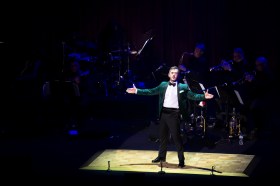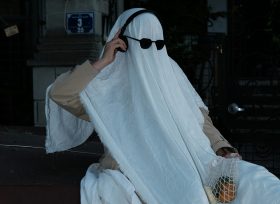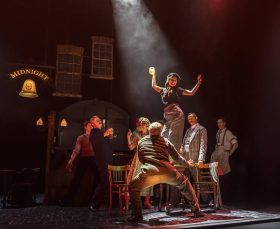Beginning May 3, the oldest US Festival dedicated to the music of J.S. Bach will take place, as it has 99 times since 1900, in the eastern Pennsylvania home town of the oldest American musical organization so dedicated, the Bach Choir of Bethlehem.
This 100th Festival will be anchored by performances of Bach’s Saint Matthew Passion and Mass in B Minor. Other events will include an exhibition entitled “The Bach Choir of Bethlehem — A Visual History,” lectures by distinguished scholars, a music and dance collaboration by the Bach Festival Orchestra and the Taylor 2 Dance Company, a chamber music recital by the Baltimore Consort, a regulation Bach Cantata Service (in which Cantata 74 is performed in its original context, a church service), the world premiere of the film Mr. Bach Comes to Call (originally staged as a family concert/drama), and will finish up with a Bach Jazz Cabaret with Donal Fox on May 12.
The Bach Choir began as a small group, organized by Ruth Porter Doster to study Bach’s Mass in B Minor under the leadership of J. Fred Wolle, organist of the Bethlehem Moravian Church, according to the choir’s website. Wolle became the Founder and first Conductor, and led the Bach Choir in the American premiere performance of the Mass at the first Festival on March 27, 1900, a commemoration of the 150th anniversary of Bach’s death in 1750.
Five years later, Wolle took a professorship at the University of California at Berkeley, and the Bach Choir disbanded. But six years later he returned, and the Bach Choir reformed, reinstating the Bach Festival in 1912, and performing in its present-day venue, Packer Memorial Chapel of Lehigh University, accompanied by the Philadelphia Orchestra.
Within a few years, the Festival became a national affair, attended by socialites and celebrities from New York, Philadelphia, and Washington, while the choir returned the favor by performing in New York’s Carnegie Hall, Philadelphia’s Academy of Music, and — having been deemed the most representative of America’s musical organizations — in the 1925 Easter Concert for the International Conference of World Fellowship Through Music in Washington, D.C. In the late 1920s and 1930s, the great American newspaperman H.L. Mencken, not an easy man to please, regularly traveled to Bethlehem from Washington in order to review the Bach Festival, and almost invariably praised the Choir’s meticulous preparation and performance.
Since then, in addition to continuing the Festival tradition without interruption up to the present day, the Choir has made numerous recordings, has performed in Bach’s own Thomaskirche in Leipzig and the Royal Albert Hall in London as well as the Kennedy Center and Carnegie Hall closer to home, and has released three videos — a one-hour special for PBS and a documentary of its UK tour of 2003, in addition to Mr. Bach Comes to Call.
At the heart of all this history and tradition today is a core group of 100 singers, all of them volunteers, under the leadership of Greg Funfgeld, the sixth Conductor of the Bach Choir, who assumed that position in 1983. The size of the choir has varied over the years — from the handful of singers in that first study group to a high-water mark of nearly 300 — and over the years the repertoire has increased from just the Mass performed at early Festivals to now three concerts year in addition to the double-feature in May.
What hasn’t changed is the dedication of these singers and their supporters — the latter as remarkable in their efforts to maintain and promote the Bach Choir and its music as the singers in their love of Bach’s music and devotion to excellence in its performance.
“I literally never heard a volunteer choir that sounded this good,” says Concertmaster Elizabeth Field of the Bach Festival Orchestra that accompanies the concerts, interviewed on the PBS documentary, Make a Joyful Noise. “They’re not paid to be here,” adds Rosa Lamoreaux, the guest soprano soloist in many Bach Choir performances and recordings. “They come for the love of the music.”
Maestro Greg Funfgeld, in a phone conversation, agreed. “I am constantly amazed at the level of devotion and commitment that these singers bring to the Bach Choir. I’m reminded of the original meaning of the word amateur, one who does something for the love of it. There are lots of professional musicians in this group, who do get paid for their music elsewhere, but who do this for love, and that love comes through in the sound of the choir.” Asked about the variety of vocations and avocations of choir members, he said, “There is such a broad spectrum of backgrounds, such a range of educational and musical opportunities drawn together by love of this music, it makes for a deep and rich thing that is an important part of their lives.”
Generations of Bethlehemites are represented in the Bach Choir. Although not yet officially a member of the choir, the star of Mr. Bach Comes to Call, for example, is Emily Young, now 14, whose father Peter (joined 1987) and grandfather Ed (joined 1955) both sing in the bass section. It was Ed’s mother Nettie, who joined the choir in 1917 and sang for 40 years,who brought him in, and he brought in his wife Ruth, who sang in the choir during the 1950s and 1960s. The Youngs’ story is not unique; every section has members with a family history in the Bach Choir.
For the sake of full disclosure, I should mention that I have been a member of the Bach Choir since 2002, when I joined primarily to take part in the upcoming UK Tour the following summer. I’ve stayed because this is a first-class musical enterprise, and I’m proud to be able to join my joyful noise with the other “whiskey tenors” in the community of souls.
Of course, it helps to have good material, and Bach’s is the best. I look forward to the 100th Festival, and hope some of you can join us in Bethlehem.




